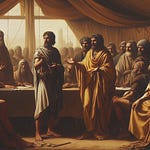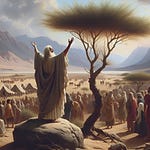Chapter Notes
Have you ever wondered why some people, when exposed to God’s Word, become increasingly angry?
In Exodus 7, Pharaoh’s unwillingness to believe and submit to God’s Word manifests in an ever-increasing hardness of heart.
Commentary
vv. 1–7 - While the first six chapters focused on God's servant, the next six chapters will focus on God's deliverance. Perhaps it is obvious, but what we read in these chapters amounts to one of the most thrilling dramas in all of human history. God tells Moses, "I have made thee a god to Pharaoh," i.e., God clothes Moses in such authority, or reveals Moses to be such a messenger from God, that the Egyptian king will eventually appeal to Moses for relief from the plagues rather than to his usual gods. This is made more significant when we remember Pharaoh thought he represented the gods. As for Aaron, he will fulfill a prophetic role. But as we saw in Exodus 4:15–16, the truth is mediated to him from God through Moses, showing how God's truth is always communicated through Christ the mediator. After some reluctance, vv. 6–7 emphasize the obedience of Moses and Aaron, despite the fact they were both octogenarians.
vv. 8–13 - God reveals to Moses that Pharaoh is going to request a miracle, and he is told to perform a similar sign to what he was given in Exodus 4 to perform for the Hebrews. The word for "serpent" is different here, pointing to a distinct reptile, but likely still a snake. Seeing this, Pharaoh in v. 11 calls for those in Egypt known to possess wisdom and unusual powers. Some Egyptian temples had a 'House of Life' which contained many papyri of ritual and magic texts. Did Pharaoh just witness something other Egyptian sages could replicate? It seems from the Jewish record and what Paul says in 2 Timothy 3, that Jannes and Jambres are the men tasked to represent Egypt. When they arrive, they appear to perform something similar. Whether "in like manner" suggests it just appeared to be like what Aaron did, or they actually performed a miracle, good men are divided. Like the Puritan William Perkins, I am inclined to think this was trickery. In our day, magicians have become entertainers. But these Egyptian magicians were likely priests, and their performance was taken seriously. Ultimately, whatever trickery they performed, they are unquestionably outdone when Aaron's serpent devours the other serpents. Having sought a miracle and seeing one, is Pharaoh humbled? Not at all. His heart is further hardened.
vv. 14–25 - The remaining verses detail the first of the plagues: turning the river into blood. Many explain away this miracle with naturalistic reasoning. Some will say the blood is not really blood. Instead of such doubts, let us see the wonderful contrast between the first plague and Christ’s first miracle. In one, the power of God through Moses acted in judgment. In the other, the power of God through Christ acted in grace. God tells Moses to meet Pharaoh by the river. The place from which God had Moses rescued by Pharaoh’s household is the place where God will begin His judgment upon Pharaoh’s household. Many believe this was not Pharaoh going to wash himself, but more likely an act of devotion and worship to that which was viewed as Egypt’s source of life. Thus, in the sight of Pharaoh and his servants, the source of Egyptian life turns to death, leading to an ecological disaster. Following this, in v. 22, the magicians perform something similar to satisfy Pharaoh. However, if these men could actually perform miracles, their aim would not be solely to duplicate what God did, but to reverse it. Instead, they only multiply their sorrows and the nation is left to lament God's judgment upon the river for seven days.
Application
Position, authority, and leadership are related but distinct concepts. God sets Moses apart for the task so much that his authority will be evident to the Egyptian monarch. Often, men make mistakes when they confuse the distinctions between position, authority, and leadership. Position is bestowed by divine providence, authority is perceived by divine unction, and leadership is proved by divine trials. So whether you are a father, a deacon, an elder, a pastor, a politician, or whatever, never stop with position. Position is an opportunity to make use of divine unction and help others. It is a place of service, not entitlement.
God's servants must preach God's words. v. 2 reveals the limited scope of what was to be communicated, namely, just what God commands. Paul tells Timothy to "hold fast the form of sound words" (2 Tim. 1:13) and to "preach the Word" (2 Tim. 4:3). This is the task of the preacher. He is not a storyteller or a self-help guru. He is not to stoop to the carnal interests of men so that every sermon has this unspoken but dominant influence of instructing people regarding what they can get out of their relationship with God. Every carnal man wants wealth, health, and perfect relationships. The goal of the preacher is to accomplish two things: to expound the person and work of Christ, and to call every sinner to submit to Him, obey Him, and be ready to die for Him.
Age is an advantage when communicating difficult news. There is a gracious condescension in God to confront Pharaoh with two men in their eighties. There is something contrary to nature that makes it difficult to listen to the admonition of someone of inferior status and age. Our Lord Jesus had to battle with this, although there is evidence that He appeared older than He was. Regardless, this natural limitation needs to be kept in mind. The aged must realize they are often best equipped to deliver difficult news, and the young must realize their youth can be a hindrance to their message. This is why Paul instructs the younger Timothy, "Rebuke not an elder, but entreat him as a father; and the younger men as brethren" (1 Tim. 5:1). If you ignore status and position, you will hinder your message. This matters.
Satan is a master of believable falsehoods. Satan is powerful. His knowledge, experience, and strength exceed man's. Thus, we should not be surprised that he can deceive men with success and ease. However, none of this requires him to be capable of genuine miracles. Genuine miracles are rare because they happen against or above the power of nature. And while Satan may function to limits of nature that exceed what man can conceive, never mind perform, this does not mean he is a miracle-worker. The point is, do not let your beliefs be shaped by what you sense. There are professing Christians who believe they speak a heavenly language. Not because it can be argued from Scripture, but because of an experience. Give your allegiance to God's Word. It is the only infallible rule of your life.
Rebellion against God leaves men without the water of life. The Nile was considered by the Egyptians to be divine and life-giving. The Egyptian god Hapi brought the annual flooding which provided so much life to the surrounding area. Osiris was said to have the river Nile as his bloodstream. Bringing the mark of death to the Nile proved the futility of such views and functions as a reminder that the only source of life for men is found in Jesus Christ. As you seek provision for your needs in life, make sure you understand the need of soul and body, and that Christ is the source of provision for both.
“Faith does not come by seeing. Men do not get faith by looking at a priest manipulating bread and wine, or sprinkling drops of baptismal water. The symbols of the Church of Rome do not beget faith. They may beget attention; they may please the fancy and delight the taste, but they do not beget the faith of God’s elect. It is the gospel—the gospel preached and heard which does this through the power of the Holy Spirit.” — Charles Spurgeon











